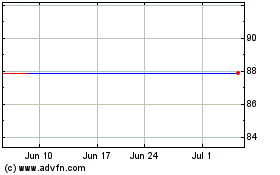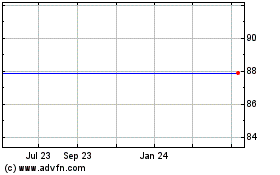Immunomedics, Inc. (NASDAQ:IMMU) (“Immunomedics”
or the “Company”) today announced that labetuzumab govitecan
(IMMU-130), the second agent from its first-in-class antibody-drug
conjugate (ADC) program, produced encouraging survival results in a
multicenter, open-label Phase 2 study in heavily-pretreated
patients with metastatic colorectal cancer (mCRC)
.
“As a single agent, IMMU-130 has demonstrated
promising efficacy in late-stage mCRC and warrants further study,”
remarked Jordan D. Berlin, MD, Professor of Medicine, Co-Leader of
the Gastrointestinal Cancer Research Program and Director of Phase
I Research at the Vanderbilt-Ingram Cancer Center, Nashville, TN,
and the senior author of the article published online in the
Journal of Clinical Oncology.1 “I believe it has potential to be
studied in a combination therapy in a frontline setting.”
Interim median progression-free survival (PFS)
and overall survival (OS) for patients who received once-weekly
labetuzumab govitecan at the 8 or 10 mg/kg dose level are
summarized below.
| |
Labetuzumab Govitecan Dose |
|
8 mg/kg once-weekly |
10 mg/kg once-weekly |
|
Number of Patients |
21 |
22 |
|
Median PFS* (months) |
4.6 (3.9 – 6.1) |
3.6 (2.1 – 6.0) |
|
Median OS (months) |
7.5 (5.7 – 16.1) |
6.4 (5.0 – 11.2) |
* Treatment response was evaluated in accordance with the rules
set by the Response Evaluation Criteria in Solid Tumors (RECIST
1.1) using computed tomography as the imaging tool for tumor size
measurements.
All of these patients had received prior
irinotecan therapy. Interestingly, 23 patients had prior treatment
with regorafenib, which was approved in the U.S. for the treatment
of patients with previously-treated mCRC based on a median PFS of
2.0 months and a median OS of 6.4 months.2 In this subset of the
patients, the median PFS and OS with labetuzumab govitecan were 4.0
and 6.7 months, respectively.
Labetuzumab govitecan is an ADC that
incorporates a moderately-toxic drug, SN-38, with an antibody
against CEACAM5, the same CEA measured in plasma and having a high
expression in many solid cancers, particularly CRC. It is the
second ADC, after the lead sacituzumab govitecan (IMMU-132) product
candidate, to be studied clinically and to show promising activity
in very advanced cancer patients. IMMU-132 has FDA Breakthrough
Therapy Designation and is being prepared for submission to the FDA
for accelerated approval as a therapeutic for patients with
relapsed/refractive, metastatic triple-negative breast cancer.
The goals of the expanded Phase 2 study with
labetuzumab govitecan were to evaluate dosing schedules, safety and
any evidence of efficacy. A total of 86 patients with progressive
disease who had received prior therapy with an
irinotecan-containing regimen, half of whom had completed 5 prior
lines of therapy, were enrolled to receive labetuzumab govitecan
either once-weekly at 8 and 10 mg/kg, or twice-weekly at 4 and 6
mg/kg, on weeks 1 and 2 of 3-week repeated cycles. The two
once-a-week dose schedules, showing comparable toxicity and
efficacy, were chosen for further study.
David M. Goldenberg, ScD, MD, founder and chief
scientific officer of the Company, stated: “We developed
labetuzumab many years ago for targeting a therapeutic radionuclide
for the therapy of colorectal cancer as well as other
CEACAM5-expressing cancers, where it showed very encouraging
activity in patients with liver metastases of colorectal cancer, as
published recently in Cancer.3 In the current use as an ADC, it was
unexpected that this relatively slow-internalizing antibody would
show anticancer activity, which suggests to us that both
internalization and release of the drug, SN-38, at the cancer cell
surface, and in the tumor environment, are important. Studies of
labetuzumab govitecan in other cancer types known to express
carcinoembryonic antigen are indicated.”
Labetuzumab govitecan was well-tolerated, with a
manageable toxicity profile. Major toxicities (Grade >3) among
all cohorts were neutropenia (16%), leukopenia (11%), anemia (9%),
and diarrhea (7%). Anti-drug or anti-antibody antibodies were not
detected.
References
- Dotan E, Cohen SJ, Starodub AN, Lieu CH, Messersmith WA,
Simpson PS, Guarino MJ, Marshall JL, Goldberg RM, Hecht JR,
Wegener WA, Sharkey RM, Govindan SV, Goldenberg DM, Berlin JD.
Phase I/II trial of labetuzumab govitecan (anti-CEACAM5/SN-38
antibody-drug conjugate) in patients with refractory/relapsing
metastatic colorectal cancer. J Clin Oncol 2017; epub August 17,
2017.
-
http://www.cancer.gov/about-cancer/treatment/drugs/fda-regorafenib.
- Sahlmann CO, Homayounfar K, Niessner M, Dyczkowski J, Conradi
LC, Braulke F, Meller B, Beißbarth T, Ghadimi BM, Meller J,
Goldenberg DM, Liersch T. Repeated adjuvant anti-CEA
radioimmunotherapy after resection of colorectal liver metastases:
Safety, feasibility, and long-term efficacy results of a
prospective phase 2 study. Cancer. 2017 Feb 15;123(4):638-649.
About ImmunomedicsImmunomedics
is a clinical-stage biopharmaceutical company developing monoclonal
antibody-based products for the targeted treatment of cancer,
autoimmune disorders and other serious diseases. Immunomedics’ most
advanced product candidate is IMMU-132 (sacituzumab govitecan), an
antibody-drug conjugate that has received Breakthrough Therapy
Designation from the FDA for the treatment of patients with
triple-negative breast cancer who have failed at least two prior
therapies for metastatic disease. Immunomedics’ primary goal is to
bring IMMU-132 to market for the benefit of patients and the
creation of stockholder value. For additional information on the
Company, please visit its website at www.immunomedics.com. The
information on its website does not, however, form a part of this
press release.
Cautionary note regarding
forward-looking statementsThis release, in addition to
historical information, may contain forward-looking statements made
pursuant to the Private Securities Litigation Reform Act of 1995.
Such statements, including statements regarding clinical trials
(including the funding therefor, anticipated patient enrollment,
trial outcomes, timing or associated costs), regulatory
applications and related timelines, out-licensing arrangements,
forecasts of future operating results, potential collaborations,
and capital raising activities, timing for bringing any product
candidate to market, involve significant risks and uncertainties
and actual results could differ materially from those expressed or
implied herein. Factors that could cause such differences include,
but are not limited to, the Company’s dependence on business
collaborations or availability of required financing from capital
markets, or other sources on acceptable terms, if at all, in order
to further develop our products and finance our operations, new
product development (including clinical trials outcome and
regulatory requirements/actions), the risk that we or any of our
collaborators may be unable to secure regulatory approval of and
market our drug candidates, risks associated with the outcome of
pending litigation and competitive risks to marketed products, and
the Company’s ability to repay its outstanding indebtedness, if and
when required, as well as the risks discussed in the Company’s
filings with the Securities and Exchange Commission. The
Company is not under any obligation, and the Company expressly
disclaims any obligation, to update or alter any forward-looking
statements, whether as a result of new information, future events
or otherwise.
For More Information:
Dr. Chau Cheng
Senior Director, Investor Relations & Corporate Secretary
(973) 605-8200, extension 123
ccheng@immunomedics.com
Media/Investor Contact:
Dan Zacchei / Josh Hochberg
Sloane & Company
212-486-9500
Dzacchei@sloanepr.com
Jhochberg@sloanepr.com
Immunomedics (NASDAQ:IMMU)
Historical Stock Chart
From Mar 2024 to Apr 2024

Immunomedics (NASDAQ:IMMU)
Historical Stock Chart
From Apr 2023 to Apr 2024
